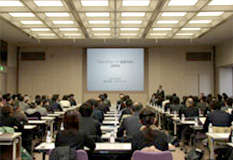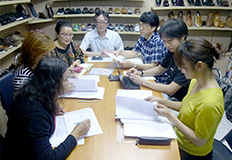Responsible Procurement Activities with Business Partners
MARUI GROUP recognizes that it has responsibilities as producer that span the entire value chain, which encompasses everything from raw material procurement through to product creation, sales, and disposal. Through co-creation with stakeholders, we strive to contribute to local communities while also going further to address human rights issues and improve work environments across the value chain.
Initiatives with Business Partners
MARUI GROUP engages in responsible procurement together with business partners across the entire value chain with respect to the development of private brands. Based on the MARUI GROUP Procurement Policy established in April 2016, the Company conveys its policies to business partners, after which it performs surveys and has dedicated staff from the Sustainability Department conduct on-site audits. The results of these activities are shared with the business partners in question so that we may advance initiatives together.
MARUI GROUP Procurement PolicyEstablished in April 2016
In order to fulfill our social responsibility in the process of manufacturing our products, MARUI GROUP adopts the attached "MARUI GROUP Procurement Policy," which provides concrete practices to be implemented in our procurement process such as the supply of safe and reliable products and services and compliance with laws and other rules, as well as human rights and working environment issues. We will work on compliance with this policy together with our suppliers engaging in the manufacture of MARUI GROUP products and services. Our suppliers are also expected to promote the same efforts with their own suppliers.
- 1. Supply of Safe and Reliable Products and Services
- – Continuously endeavor to improve the quality of products based on quality control systems.
- – Endeavor to ensure the health and safety of product users.
- 2. Compliance with Laws and Other Rules
- – Comply with laws, regulations, treaties, industrial standards, and other related international rules applicable in the countries and areas where business is being conducted (hereinafter "Laws and Other Rules").
- 3. Respect for Human Rights
- – Refrain from using child labor. Refrain from employing young workers in tasks that are likely to jeopardize their health, safety, or morals.
- – Ensure that all employees provide their services voluntarily.
- – Refrain from using corporal punishment or other physical or mental coercion or verbal abuse.
- – Refrain from discrimination.
- 4. Establishment of Proper Working Environment
- – Pay wages and allowances, provide employee welfare benefits, and enter into labor contracts appropriately.
- – Set working hours and provide holidays, vacations, and rest periods in compliance with Laws and Other Rules. Overtime work is to be performed only with employees' consent and in accordance with statutory procedures.
- – Respect employees' rights to establish and join organizations and to bargain collectively without interference or oppression.
- – Provide all employees with a safe, healthy, and sanitary working environment including buildings, facilities, etc.
- 5. Fair Trade
- – Engage in business in a fair and proper manner. Providing gifts or entertainment in order to obtain or maintain an unfair advantage or preference is not allowed.
- – Refrain from engaging in an activity which may impede free competition or imposing a one-sided transaction by abuse of a superior bargaining position.
- – Perform import and export transactions appropriately.
- – Protect trademark rights, copyrights, patent rights and other intellectual property rights, and respect such intellectual property rights of third parties.
- – Refrain from engaging in any relationship with anti-social forces.
- 6. Protection of Information
- – Appropriately manage confidential information and personal information.
- 7. Conservation of the Environment
- – Comply with Laws and Other Rules concerning the environment, and engage in activities to prevent environmental pollution and to reduce negative impacts on the environment.
- 8. Contribution to Local Communities
- – Become involved in and build good relationships with local communities.
- 9. Establishment and Implementation of Infrastructure for This Policy
- – Establish infrastructure to implement this policy and share with employees.
- – When MARUI GROUP or a representative selected by MARUI GROUP examines suppliers' compliance of this policy with regard to their factories or offices, the suppliers and MARUI GROUP or its representative will cooperate with each other.
Communication with Business Partners
In March 2016, a step ahead of the release of the MARUI GROUP Procurement Policy, the Company held an explanatory forum for roughly 100 business partners related to its private brands.
At this explanatory forum, we discussed the importance of addressing human rights, labor, and other issues across the supply chain, explaining MARUI GROUP's policies in this regard while using actual cases. Business partners participating in the forum expressed their understanding of our stance and their intent to work together with us in addressing these issues. Surveys were then issued to business partners and dedicated staff from the Sustainability Department conducted on-site audits. The results of these activities are being shared with business partners. Furthermore, we used a briefing held for private brand business partners in March 2018 as an opportunity to share information regarding the revised MARUI GROUP Code of Conduct as well as the MARUI GROUP Human Rights Policy, both of which were introduced in November 2017.
On-site inspections are conducted at the domestic and overseas factories of manufacturing subcontractors. Through these inspections, we confirm conditions related to occupational health and safety, including the brightness of lighting, the orderliness and cleanliness of factories, and work hours.
We consider third-party opinions, and, when business partners have been found not to be in compliance with our policies, we work together with them to pursue improvements so that procurement activities can be continued.
-

- Explanatory forum for business partners
-

- On-site meeting with business partner
-
Flow of CSR Procurement Initiatives

This sustainability website is designed to accommodate people with color blindness.











